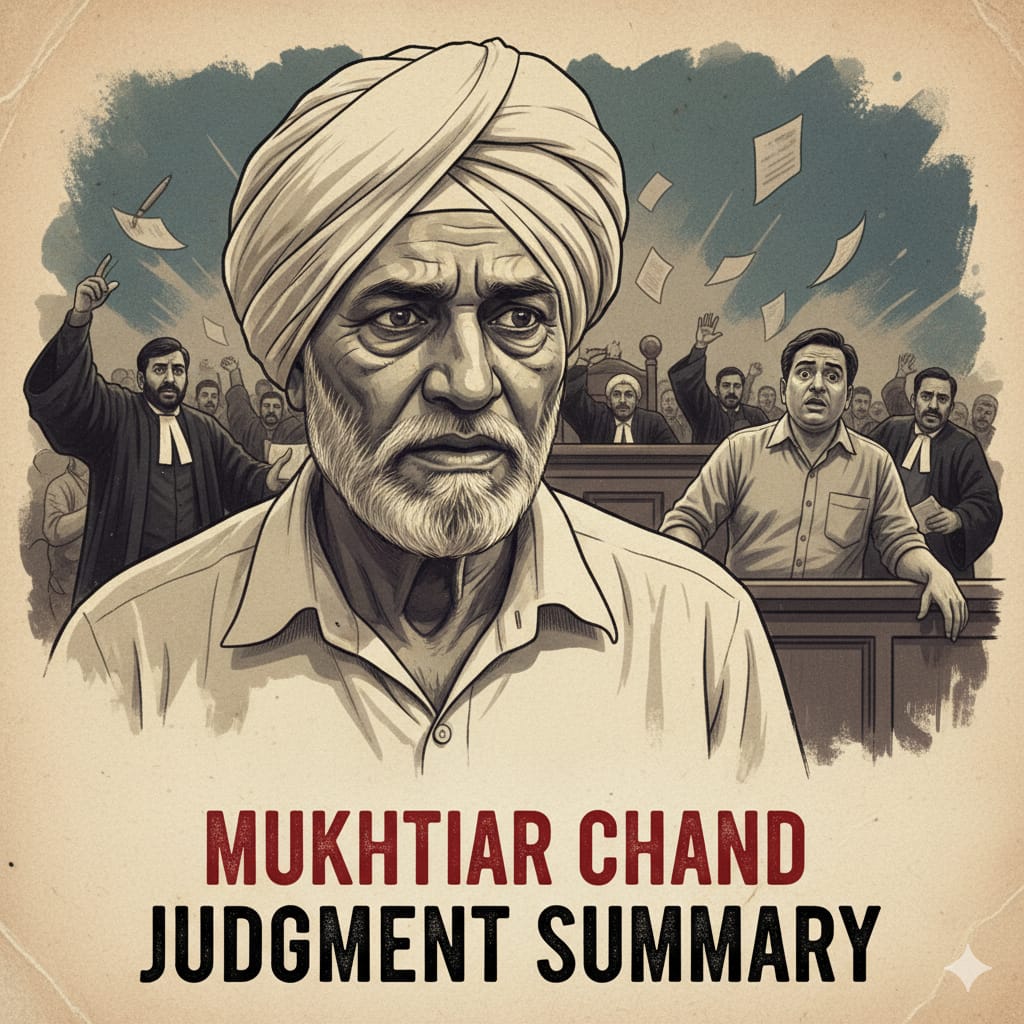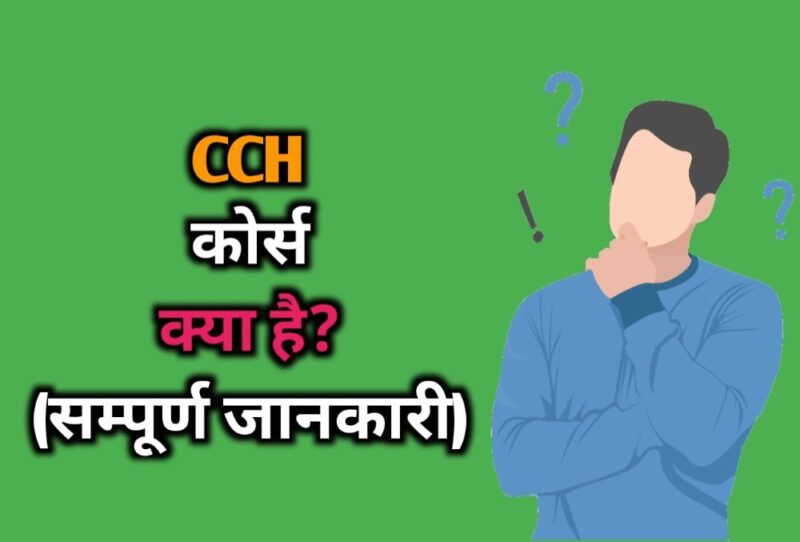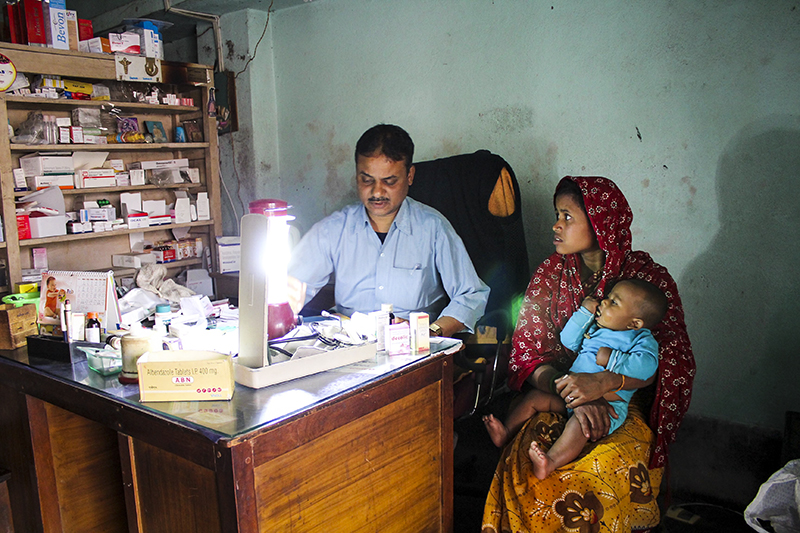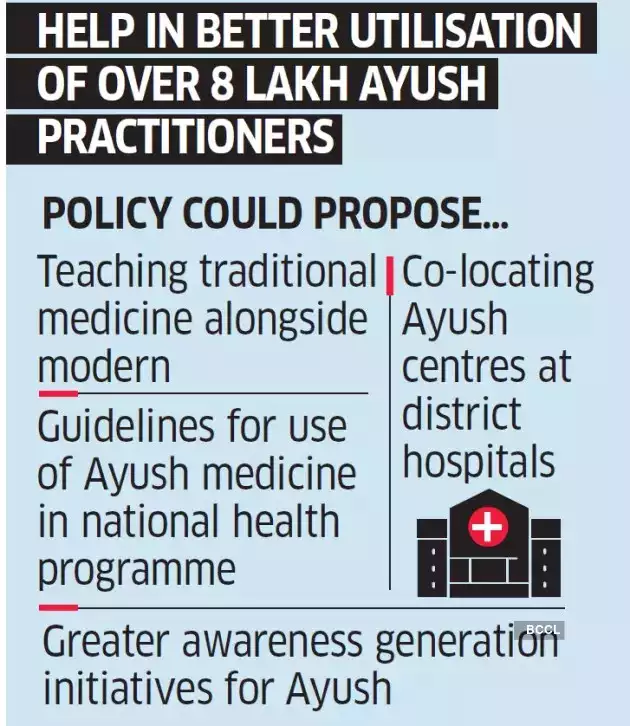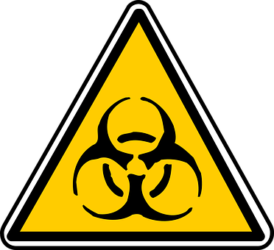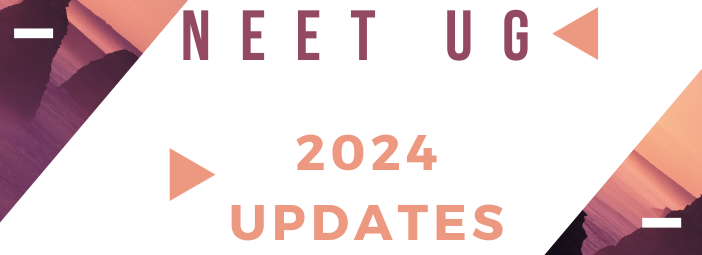Blog
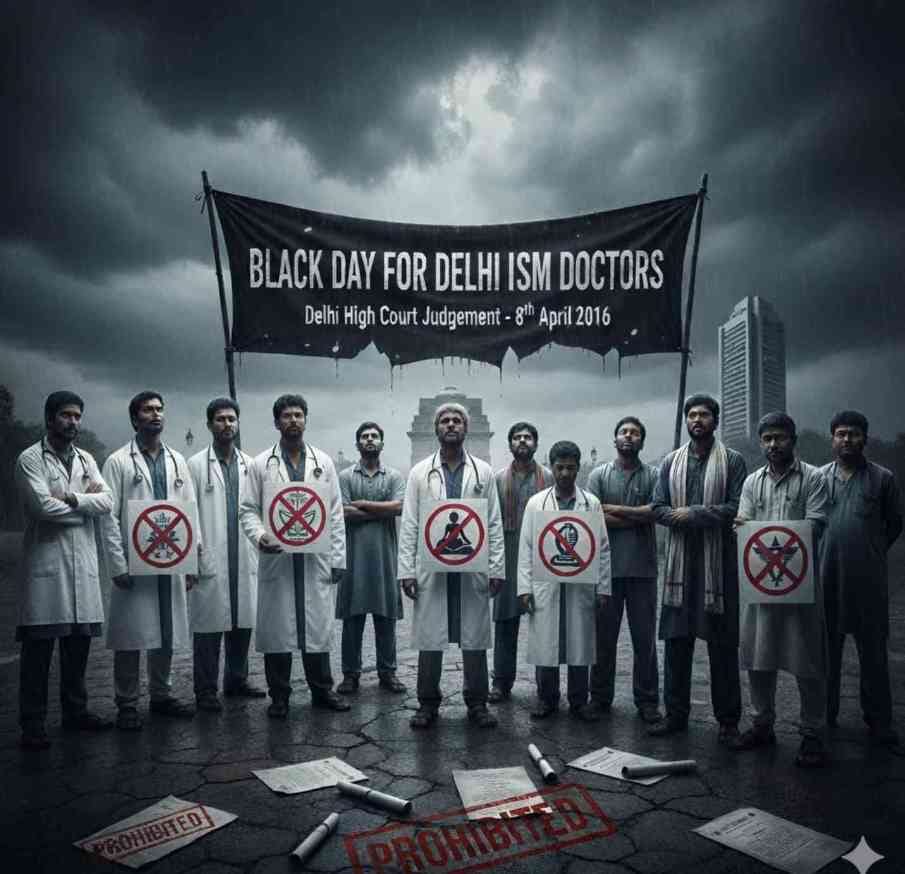
Summery of 8 th April,2016 Judgement
Summary of the Delhi High Court Judgment: W.P.(C) No. 7865/2010
Delhi Medical Association Petitioner v. Principal Secretary (Health) & Ors. दिल्ली मेडिकल एसोसिएशन याचिकाकर्ता बनाम प्रमुख सचिव (स्वास्थ्य) एवं अन्य
This summary is based on the judgment of the High Court of Delhi, delivered on April 8, 2016 considered Black day in Delhi ISM.यह सारांश दिल्ली उच्च न्यायालय द्वारा 8 अप्रैल, 2016 को दिए गए निर्णय पर आधारित है, जिसे दिल्ली आईएसएम में काला दिवस माना गया।
Factual and Procedural Background तथ्यात्मक एवं प्रक्रियात्मक पृष्ठभूमि
This Public Interest Litigation under Article 226 of the Constitution of India was filed by the Delhi Medical Association seeking directions to prevent practitioners of Indian System of Medicine and Homoeopathic Medicine from practicing Allopathic System of Medicine, including prescribing Allopathic medicines. The petition challenged Section 2(h) of the Delhi Bharatiya Chikitsa Parishad Act, 1998 and a Notification dated 19 May 2004 issued by the Central Council of Indian Medicine (CCIM), which practitioners of Indian System of Medicine relied upon to claim the right to practice Allopathic medicine. भारतीय संविधान के अनुच्छेद 226 के तहत यह जनहित याचिका दिल्ली मेडिकल एसोसिएशन द्वारा दायर की गई थी, जिसमें भारतीय चिकित्सा पद्धति और होम्योपैथिक चिकित्सा के चिकित्सकों को एलोपैथिक चिकित्सा पद्धति का अभ्यास करने से रोकने के लिए निर्देश देने की मांग की गई थी, जिसमें एलोपैथिक दवाएं लिखना भी शामिल है। याचिका में दिल्ली भारतीय चिकित्सा परिषद अधिनियम, 1998 की धारा 2(एच) और भारतीय चिकित्सा केन्द्रीय परिषद (सीसीआईएम) द्वारा जारी 19 मई 2004 की अधिसूचना को चुनौती दी गई थी, जिस पर भारतीय चिकित्सा पद्धति के चिकित्सकों ने एलोपैथिक चिकित्सा पद्धति का अभ्यास करने के अधिकार का दावा करने के लिए भरोसा किया था।
The petition was admitted and heard with counter affidavits filed by some respondents, while others did not respond despite opportunities. Applications for impleadment by various associations and NGOs representing practitioners of Indian System of Medicine were allowed in part. Written submissions were filed by the petitioner, Delhi Medical Council (DMC), Delhi Bharatiya Chikitsa Parishad (DBCP), and some intervenors. The court reserved judgment after hearing arguments and submissions. याचिका को स्वीकार कर लिया गया और कुछ प्रतिवादियों द्वारा दायर प्रति-शपथपत्रों के साथ सुनवाई की गई, जबकि अन्य ने अवसर दिए जाने के बावजूद कोई प्रतिक्रिया नहीं दी। भारतीय चिकित्सा पद्धति के चिकित्सकों का प्रतिनिधित्व करने वाले विभिन्न संघों और गैर-सरकारी संगठनों द्वारा पक्षकार बनने के आवेदन आंशिक रूप से स्वीकार कर लिए गए। याचिकाकर्ता, दिल्ली चिकित्सा परिषद (डीएमसी), दिल्ली भारतीय चिकित्सा परिषद (डीबीसीपी), और कुछ हस्तक्षेपकर्ताओं द्वारा लिखित प्रस्तुतियाँ प्रस्तुत की गईं। अदालत ने दलीलें और प्रस्तुतियाँ सुनने के बाद फैसला सुरक्षित रख लिया।
Legal Issues Presented प्रस्तुत कानूनी मुद्दे
1.Whether practitioners of Indian System of Medicine or Homoeopathic Medicine are entitled to practice Allopathic System of Medicine, including prescribing Allopathic medicines.
1. क्या भारतीय चिकित्सा पद्धति या होम्योपैथिक चिकित्सा पद्धति के चिकित्सक एलोपैथिक चिकित्सा पद्धति का अभ्यास करने के हकदार हैं, जिसमें एलोपैथिक दवाएँ लिखना भी शामिल है।2.Whether Section 2(h) of the Delhi Bharatiya Chikitsa Parishad Act, 1998 and the Notification dated 19 May 2004 of the CCIM permit practitioners of Indian System of Medicine to practice Allopathic medicine.
- क्या दिल्ली भारतीय चिकित्सा परिषद अधिनियम, 1998 की धारा 2(एच) और सीसीआईएम की 19 मई 2004 की अधिसूचना भारतीय चिकित्सा पद्धति के चिकित्सकों को एलोपैथिक चिकित्सा पद्धति का अभ्यास करने की अनुमति देती है।
3.The scope and effect of the definition of “integrated medicine” under the DBCP Act and its relation to the Indian Medical Council Act, 1956 (MCI Act).
- डीबीसीपी अधिनियम के तहत “एकीकृत चिकित्सा” की परिभाषा का दायरा और प्रभाव तथा भारतीय चिकित्सा परिषद अधिनियम, 1956 (एमसीआई अधिनियम) से इसका संबंध।
4.The validity and applicability of notifications and declarations under the Drugs and Cosmetics Rules, 1945, particularly Rule 2(ee) and related notifications.
- औषधि एवं प्रसाधन सामग्री नियम, 1945, विशेष रूप से नियम 2(ईई) और संबंधित अधिसूचनाओं के तहत अधिसूचनाओं और घोषणाओं की वैधता और प्रयोज्यता।
5.The interpretation and application of the Supreme Court judgment in Dr. Mukhtiar Chand vs. State of Punjab (1998) 7 SCC 579 in the context of the rights of practitioners of Indian System of Medicine to practice Allopathic medicine.
- भारतीय चिकित्सा पद्धति के चिकित्सकों के एलोपैथिक चिकित्सा पद्धति का अभ्यास करने के अधिकारों के संदर्भ में डॉ. मुख्तियार चंद बनाम पंजाब राज्य (1998) 7 एससीसी 579 में सर्वोच्च न्यायालय के निर्णय की व्याख्या और अनुप्रयोग।
Arguments of the Parties पक्षकारों के तर्क
Petitioner’s Arguments याचिकाकर्ता के तर्क
- The petitioner is an association of registered Allopathic medical practitioners affiliated with the Indian Medical Association. 1. याचिकाकर्ता भारतीय चिकित्सा संघ से संबद्ध पंजीकृत एलोपैथिक चिकित्सकों का एक संघ है।
- The Central Government enacted separate laws to define and regulate different systems of medicine to prevent practitioners of one system from practicing another. 2.केंद्र सरकार ने विभिन्न चिकित्सा प्रणालियों को परिभाषित और विनियमित करने के लिए अलग-अलग कानून बनाए हैं ताकि एक चिकित्सा पद्धति के चिकित्सकों को दूसरी चिकित्सा पद्धति अपनाने से रोका जा सके।
- Practitioners of Indian System of Medicine registered with DBCP have been illegally prescribing Allopathic medicines without registration in the State Medical Register or Indian Medical Register. 3. डीबीसीपी में पंजीकृत भारतीय चिकित्सा पद्धति के चिकित्सक राज्य चिकित्सा रजिस्टर या भारतीय चिकित्सा रजिस्टर में पंजीकरण के बिना अवैध रूप से एलोपैथिक दवाएँ लिख रहे हैं।
- This practice endangers public health and constitutes quackery. 4. यह प्रथा जन स्वास्थ्य के लिए खतरा है और नीमहकीमी है।
- The respondent authorities have failed to prevent such unauthorized practice despite representations. 5.प्रतिवादी प्राधिकारी अभ्यावेदन के बावजूद इस तरह के अनधिकृत अभ्यास को रोकने में विफल रहे हैं।
- Section 2(h) of the DBCP Act and the CCIM Notification dated 19 May 2004 are contrary to the MCI Act and enable practitioners of Indian System of Medicine to claim rights to practice Allopathic medicine unlawfully. 6.डी.बी.सी.पी. अधिनियम की धारा 2(एच) और सी.सी.आई.एम. की 19 मई 2004 की अधिसूचना एम.सी.आई. अधिनियम के विपरीत हैं और भारतीय चिकित्सा पद्धति के चिकित्सकों को अवैध रूप से एलोपैथिक चिकित्सा पद्धति का अभ्यास करने के अधिकार का दावा करने में सक्षम बनाती हैं।
- Various High Court judgments support the view that practitioners of Indian System of Medicine cannot practice modern (Allopathic) medicine without recognized qualification. 7.विभिन्न उच्च न्यायालयों के निर्णय इस दृष्टिकोण का समर्थन करते हैं कि भारतीय चिकित्सा पद्धति के चिकित्सक मान्यता प्राप्त योग्यता के बिना आधुनिक (एलोपैथिक) चिकित्सा पद्धति का अभ्यास नहीं कर सकते।
Respondent No.5 (Delhi Medical Council) Arguments प्रतिवादी संख्या 5 (दिल्ली मेडिकल काउंसिल) के तर्क
- Supported the petitioner’s contentions. 1. याचिकाकर्ता के तर्कों का समर्थन किया।
- Contended that the definition of “integrated medicine” in the DBCP Act cannot expand the scope of Indian System of Medicine under the Indian Medicine Act. 2.तर्क दिया कि डीबीसीपी अधिनियम में “एकीकृत चिकित्सा” की परिभाषा भारतीय चिकित्सा अधिनियम के तहत भारतीय चिकित्सा पद्धति के दायरे का विस्तार नहीं कर सकती।
- Emphasized that the MCI Act regulates modern scientific medicine and only those enrolled in the Indian Medical Register are entitled to practice it. 3.इस बात पर ज़ोर दिया कि एमसीआई अधिनियम आधुनिक वैज्ञानिक चिकित्सा को नियंत्रित करता है और केवल भारतीय चिकित्सा रजिस्टर में नामांकित व्यक्ति ही इसका अभ्यास करने के हकदार हैं।
- Practitioners of Indian System of Medicine without recognized qualifications under the MCI Act are not entitled to practice modern scientific medicine. 4.एमसीआई अधिनियम के तहत मान्यता प्राप्त योग्यता के बिना भारतीय चिकित्सा पद्धति के चिकित्सक आधुनिक वैज्ञानिक चिकित्सा पद्धति का अभ्यास करने के हकदार नहीं हैं।
Respondent No.4 (Director, Health Services, GNCTD) Arguments प्रतिवादी संख्या 4 (निदेशक, स्वास्थ्य सेवाएँ, जीएनसीटीडी) तर्क
- Stated that an Anti-Quackery Cell exists in alliance with DMC, DBCP, and Police to inspect clinics and take action against fake doctors. 1.कहा गया कि क्लीनिकों का निरीक्षण करने और फर्जी डॉक्टरों के खिलाफ कार्रवाई करने के लिए डीएमसी, डीबीसीपी और पुलिस के साथ मिलकर एक एंटी-क्वैकरी सेल मौजूद है।
- Asserted active role against unauthorized practitioners. 2.अनधिकृत चिकित्सकों के खिलाफ सक्रिय भूमिका का दावा किया गया।
Respondent No.9 (Delhi Bharatiya Chikitsa Parishad) Arguments प्रतिवादी संख्या 9 (दिल्ली भारतीय चिकित्सा परिषद) तर्क
- Contended that registration under the DBCP Act entitles practitioners to practice Indian System of Medicine supplemented by modern advances as notified by CCIM. 1.तर्क दिया कि डीबीसीपी अधिनियम के तहत पंजीकरण चिकित्सकों को सीसीआईएम द्वारा अधिसूचित आधुनिक प्रगति के साथ भारतीय चिकित्सा पद्धति का अभ्यास करने का अधिकार देता है।
- Argued that integrated courses provide teaching and training in modern advances, including Allopathic medicine. 2.तर्क दिया कि एकीकृत पाठ्यक्रम एलोपैथिक चिकित्सा सहित आधुनिक प्रगति में शिक्षण और प्रशिक्षण प्रदान करते हैं।
- Relied on the Supreme Court judgment in Dr. Mukhtiar Chand to support the right to practice modern scientific medicine. 3.आधुनिक वैज्ञानिक चिकित्सा पद्धति का अभ्यास करने के अधिकार का समर्थन करने के लिए डॉ. मुख्तियार चंद मामले में सर्वोच्च न्यायालय के फैसले पर भरोसा किया।
Impleading Associations and NGOs Supporting Practitioners of Indian System of Medicine भारतीय चिकित्सा पद्धति के चिकित्सकों का समर्थन करने वाले संघों और गैर-सरकारी संगठनों को पक्षकार बनाना
1.Argued that the petition was motivated by professional jealousy and was an attempt to circumvent prior orders. 1.तर्क दिया गया कि याचिका पेशेवर ईर्ष्या से प्रेरित थी और पूर्व आदेशों को दरकिनार करने का एक प्रयास थी।
2.Asserted that the DBCP Act authorizes practitioners to practice modern scientific medicine due to integrated training. 2.दावा किया गया कि डीबीसीपी अधिनियम एकीकृत प्रशिक्षण के कारण चिकित्सकों को आधुनिक वैज्ञानिक चिकित्सा पद्धति का अभ्यास करने के लिए अधिकृत करता है।
3.Claimed that Indian Medicine Act empowers CCIM to supplement Indian System of Medicine with modern advances. 3.दावा किया गया कि भारतीय चिकित्सा अधिनियम सीसीआईएम को आधुनिक प्रगति के साथ भारतीय चिकित्सा पद्धति को पूरक बनाने का अधिकार देता है।
4.Cited various High Court orders quashing proceedings against practitioners of Indian System of Medicine. 4.भारतीय चिकित्सा पद्धति के चिकित्सकों के विरुद्ध कार्यवाही को रद्द करने वाले विभिन्न उच्च न्यायालयों के आदेशों का हवाला दिया गया।
5.Highlighted the need for practitioners in rural and economically backward areas due to shortage of qualified doctors. 5.योग्य चिकित्सकों की कमी के कारण ग्रामीण और आर्थिक रूप से पिछड़े क्षेत्रों में चिकित्सकों की आवश्यकता पर प्रकाश डाला गया।
Table of Precedents Cited उद्धृत उदाहरणों की तालिका
Precedent पूर्व उदाहरण
Dr. Mukhtiar Chand vs. State of Punjab (1998)7 SCC 579 डॉ. मुख्तियार चंद बनाम पंजाब राज्य (1998)7 SCC 579
Rule or Principle Cited For उद्धृत नियम या सिद्धांत
1.Distinction between Indian System of Medicine and modern scientific (Allopathic)medicine. 1. भारतीय चिकित्सा पद्धति और आधुनिक वैज्ञानिक (एलोपैथिक) चिकित्सा पद्धति के बीच अंतर।
2.Only persons registered under State Medical Register as per MCI Act can practice modern scientific medicine. 2. केवल एमसीआई अधिनियम के अनुसार राज्य चिकित्सा रजिस्टर के अंतर्गत पंजीकृत व्यक्ति ही आधुनिक वैज्ञानिक चिकित्सा पद्धति का अभ्यास कर सकते हैं।
3.Registration under Indian Medicine Act alone does not confer right to practice Allopathic medicine. 3. केवल भारतीय चिकित्सा अधिनियम के अंतर्गत पंजीकरण ही एलोपैथिक चिकित्सा पद्धति का अभ्यास करने का अधिकार प्रदान नहीं करता है।
4.Rule 2(ee)(iii) of Drugs Rules and related notifications valid but applicable only where State law confers right to practice. 4. औषधि नियमों का नियम 2(ईई)(iii) और संबंधित अधिसूचनाएँ मान्य हैं, लेकिन केवल वहीं लागू होती हैं जहाँ राज्य कानून अभ्यास करने का अधिकार प्रदान करता है।
Application by the Court न्यायालय द्वारा अनुप्रयोग
The Court relied heavily on this judgment to conclude that the practitioners of Indian System of Medicine, even if holding integrated medicine qualifications and registered under DBCP Act, are not entitled to practice modern scientific (Allopathic) medicine unless also registered under the State Medical Register as per MCI Act. न्यायालय ने इस निर्णय पर अत्यधिक भरोसा करते हुए निष्कर्ष निकाला कि भारतीय चिकित्सा पद्धति के चिकित्सक, भले ही उनके पास एकीकृत चिकित्सा योग्यता हो और वे डीबीसीपी अधिनियम के अंतर्गत पंजीकृत हों, आधुनिक वैज्ञानिक (एलोपैथिक) चिकित्सा पद्धति का अभ्यास करने के हकदार नहीं हैं, जब तक कि वे एमसीआई अधिनियम के अनुसार राज्य चिकित्सा रजिस्टर के अंतर्गत भी पंजीकृत न हों।
Court’s Reasoning and Analysis न्यायालय का तर्क और विश्लेषण
The Court examined the legislative framework governing medical practice in India, focusing on the Indian Medical Council Act, 1956 (MCI Act), the Indian Medicine Central Council Act,1970 (Indian Medicine Act), the Delhi Bharatiya Chikitsa Parishad Act, 1998 (DBCP Act), and the Delhi Medical Council Act, 1997 (DMC Act). न्यायालय ने भारतीय चिकित्सा परिषद अधिनियम, 1956 (एमसीआई अधिनियम), भारतीय चिकित्सा केंद्रीय परिषद अधिनियम, 1970 (भारतीय चिकित्सा अधिनियम), दिल्ली भारतीय चिकित्सा परिषद अधिनियम, 1998 (डीबीसीपी अधिनियम), और दिल्ली चिकित्सा परिषद अधिनियम, 1997 (डीएमसी अधिनियम) पर ध्यान केंद्रित करते हुए भारत में चिकित्सा पद्धति को नियंत्रित करने वाले विधायी ढाँचे की जाँच की।
It noted that the MCI Act regulates modern scientific medicine (Allopathic system) and maintains the Indian Medical Register, while the Indian Medicine Act regulates the Indian System of Medicine and maintains a separate Central and State Register of Indian Medicine. इसे नोट किया कि एमसीआई अधिनियम आधुनिक वैज्ञानिक चिकित्सा (एलोपैथिक प्रणाली) को नियंत्रित करता है और भारतीय चिकित्सा रजिस्टर का रखरखाव करता है, जबकि भारतीय चिकित्सा अधिनियम भारतीय चिकित्सा पद्धति को नियंत्रित करता है और भारतीय चिकित्सा का एक अलग केंद्रीय और राज्य रजिस्टर रखता है।
The DBCP Act provides for maintenance of the State Register of Indian Medicine in Delhi. डीबीसीपी अधिनियम दिल्ली में भारतीय चिकित्सा के राज्य रजिस्टर के रखरखाव का प्रावधान करता है।
The Court found that the definitions of “Indian Medicine” and “integrated medicine” in the Indian Medicine Act and DBCP Act, and the CCIM’s Notification dated 19 May 2004, which refer to “modern advances,” do not extend the right to practice modern scientific medicine beyond the Indian System of Medicine. These provisions enable practitioners to use modern diagnostic tools and advances within their system but do not authorize them to practice Allopathic medicine. न्यायालय ने पाया कि भारतीय चिकित्सा अधिनियम और डीबीसीपी अधिनियम में “भारतीय चिकित्सा” और “एकीकृत चिकित्सा” की परिभाषाएँ, और सीसीआईएम की 19 मई 2004 की अधिसूचना, जो “आधुनिक प्रगति” का उल्लेख करती है, भारतीय चिकित्सा पद्धति से परे आधुनिक वैज्ञानिक चिकित्सा पद्धति का अभ्यास करने के अधिकार का विस्तार नहीं करती हैं। ये प्रावधान चिकित्सकों को अपनी चिकित्सा पद्धति में आधुनिक निदान उपकरणों और उन्नत तकनीकों का उपयोग करने में सक्षम बनाते हैं, लेकिन उन्हें एलोपैथिक चिकित्सा पद्धति का अभ्यास करने का अधिकार नहीं देते।
The Court carefully analyzed the Supreme Court’s ruling in Dr. Mukhtiar Chand, emphasizing that only those enrolled in the State Medical Register under the MCI Act, possessing recognized medical qualifications, can practice modern scientific medicine. The similarity interminology between the “State Medical Register” under the MCI Act and the “State Register of Indian Medicine” under the Indian Medicine Act was clarified to avoid confusion. न्यायालय ने डॉ. मुख्तियार चंद मामले में सर्वोच्च न्यायालय के फैसले का सावधानीपूर्वक विश्लेषण किया और इस बात पर ज़ोर दिया कि केवल एमसीआई अधिनियम के तहत राज्य चिकित्सा रजिस्टर में नामांकित और मान्यता प्राप्त चिकित्सा योग्यता रखने वाले लोग ही आधुनिक वैज्ञानिक चिकित्सा पद्धति का अभ्यास कर सकते हैं। एमसीआई अधिनियम के तहत “राज्य चिकित्सा रजिस्टर” और भारतीय चिकित्सा अधिनियम के तहत “भारतीय चिकित्सा पद्धति का राज्य रजिस्टर” के बीच समानता संबंधी अंतरसंबंध को भ्रम से बचने के लिए स्पष्ट किया गया था।
The Court observed that the DMC Act for Delhi does not allow registration of practitioners holding only Indian System of Medicine qualifications, including integrated medicine degrees, in the State Medical Register. Consequently, such practitioners cannot legally practice modern scientific medicine in Delhi. न्यायालय ने कहा कि दिल्ली के लिए डीएमसी अधिनियम, केवल भारतीय चिकित्सा पद्धति की योग्यताएँ, जिनमें एकीकृत चिकित्सा की डिग्रियाँ भी शामिल हैं, रखने वाले चिकित्सकों को राज्य चिकित्सा रजिस्टर में पंजीकृत करने की अनुमति नहीं देता। परिणामस्वरूप, ऐसे चिकित्सक कानूनी रूप से दिल्ली में आधुनिक वैज्ञानिक चिकित्सा पद्धति का अभ्यास नहीं कर सकते।
The Court also rejected arguments based on the Drugs and Cosmetics Rules notifications, holding that these do not override the statutory provisions of the MCI Act and related laws governing medical practice qualifications. न्यायालय ने औषधि एवं प्रसाधन सामग्री नियम अधिसूचनाओं पर आधारित तर्कों को भी खारिज कर दिया और कहा कि ये एमसीआई अधिनियम और चिकित्सा पद्धति योग्यताओं को नियंत्रित करने वाले संबंधित कानूनों के वैधानिक प्रावधानों का उल्लंघन नहीं करते।
Finally, the Court found the CCIM’s Notification of 2004 misleading as it could be interpreted as permitting practitioners without recognized qualifications in modern scientific medicine to practice Allopathic medicine, which is contrary to law and potentially harmful to public health. अंततः, न्यायालय ने सीसीआईएम की 2004 की अधिसूचना को भ्रामक पाया, क्योंकि इसकी व्याख्या इस प्रकार की जा सकती है कि इसमें आधुनिक वैज्ञानिक चिकित्सा में मान्यता प्राप्त योग्यता के बिना भी चिकित्सकों को एलोपैथिक चिकित्सा पद्धति अपनाने की अनुमति दी गई है, जो कानून के विपरीत है और सार्वजनिक स्वास्थ्य के लिए संभावित रूप से हानिकारक है।
Holding and Implications निर्णय और निहितार्थ
Holding निर्णय:
No practitioner of Indian System of Medicine, including those holding qualifications in integrated medicine as defined in the DBCP Act, is entitled to practice modern scientific (Allopathic) medicine as defined under the Indian Medical Council Act, 1956 and Indian Medical Degrees Act, 1916. भारतीय चिकित्सा पद्धति का कोई भी चिकित्सक, जिसमें डीबीसीपी अधिनियम में परिभाषित एकीकृत चिकित्सा में योग्यता रखने वाले चिकित्सक भी शामिल हैं, भारतीय चिकित्सा परिषद अधिनियम, 1956 और भारतीय चिकित्सा उपाधि अधिनियम, 1916 के तहत परिभाषित आधुनिक वैज्ञानिक (एलोपैथिक) चिकित्सा पद्धति का अभ्यास करने का हकदार नहीं है।
Section 2(h) of the Delhi Bharatiya Chikitsa Parishad Act, 1998, the Notification dated 19 May 2004 of the CCIM, and the Notification dated 10 February 1961 of the Delhi Government under the Drugs and Cosmetics Rules do not permit such practitioners to practice modern scientific medicine or prescribe Allopathic drugs. दिल्ली भारतीय चिकित्सा परिषद अधिनियम, 1998 की धारा 2(एच), सीसीआईएम की 19 मई 2004 की अधिसूचना और औषधि एवं प्रसाधन सामग्री नियमों के तहत दिल्ली सरकार की 10 फरवरी 1961 की अधिसूचना ऐसे चिकित्सकों को आधुनिक वैज्ञानिक चिकित्सा पद्धति का अभ्यास करने या एलोपैथिक दवाएं लिखने की अनुमति नहीं देती है।
Authorities responsible for enforcement of the Indian Medical Council Act, Delhi Medical Council Act, Indian Medicine Central Council Act, and the Delhi Bharatiya Chikitsa Parishad Act are directed to prevent persons not holding qualifications listed in the Schedules of the Indian Medical Council Act from practicing modern scientific medicine. भारतीय चिकित्सा परिषद अधिनियम, दिल्ली चिकित्सा परिषद अधिनियम, भारतीय चिकित्सा केंद्रीय परिषद अधिनियम और दिल्ली भारतीय चिकित्सा परिषद अधिनियम के प्रवर्तन के लिए जिम्मेदार अधिकारियों को निर्देश दिया जाता है कि वे भारतीय चिकित्सा परिषद अधिनियम की अनुसूचियों में सूचीबद्ध योग्यता न रखने वाले व्यक्तियों को आधुनिक वैज्ञानिक चिकित्सा पद्धति का अभ्यास करने से रोकें।
Implications निहितार्थ:
This decision strictly delineates the boundaries between the Indian System of Medicine and modern scientific (Allopathic) medicine, reaffirming that only those registered under the MCI Act with recognized qualifications can legally practice Allopathic medicine. It prevents practitioners of Indian System of Medicine from encroaching into the Allopathic field without appropriate registration and qualifications, thereby aiming to protect public health and maintain professional standards. No new precedent beyond the interpretation of existing statutes and the Supreme Court judgment in Dr. Mukhtiar Chand is established. यह निर्णय भारतीय चिकित्सा पद्धति और आधुनिक वैज्ञानिक (एलोपैथिक) चिकित्सा के बीच की सीमाओं को सख्ती से रेखांकित करता है, और इस बात की पुष्टि करता है कि केवल एमसीआई अधिनियम के तहत पंजीकृत और मान्यता प्राप्त योग्यता वाले लोग ही कानूनी रूप से एलोपैथिक चिकित्सा पद्धति का अभ्यास कर सकते हैं। यह भारतीय चिकित्सा पद्धति के चिकित्सकों को उचित पंजीकरण और योग्यता के बिना एलोपैथिक क्षेत्र में अतिक्रमण करने से रोकता है, जिससे जन स्वास्थ्य की रक्षा और पेशेवर मानकों को बनाए रखने का लक्ष्य प्राप्त होता है। मौजूदा कानूनों और डॉ. मुख्तियार चंद मामले में सर्वोच्च न्यायालय के फैसले की व्याख्या से परे कोई नई मिसाल कायम नहीं होती।
The parties are directed to bear their own costs. पक्षों को निर्देश दिया जाता है कि वे अपना खर्च स्वयं वहन करें।
Summary of the Review Petition समीक्षा याचिका का सारांश
I. The Original Judgment (April 8, 2016) मूल निर्णय (8 अप्रैल, 2016)
The original judgment was a decisive ruling in a Public Interest Litigation (PIL) filed by the Delhi Medical Association (DMA). मूल निर्णय दिल्ली मेडिकल एसोसिएशन (DMA) द्वारा दायर एक जनहित याचिका (PIL) में एक निर्णायक फैसला था।
What the Original Judgment Ruled: मूल निर्णय में क्या कहा गया:
- The High Court allowed the writ petition. उच्च न्यायालय ने रिट याचिका स्वीकार कर ली।
- It was declared that practitioners of the Indian System of Medicine (ISM) or those holding a qualification listed in the Schedule to the Indian Medicine Central Council Act, 1970, are not entitled to practice the modern scientific system of medicine (Allopathy). यह घोषित किया गया कि भारतीय चिकित्सा पद्धति (ISM) के चिकित्सक या भारतीय चिकित्सा केंद्रीय परिषद अधिनियम, 1970 की अनुसूची में सूचीबद्ध योग्यता रखने वाले चिकित्सक आधुनिक वैज्ञानिक चिकित्सा पद्धति (एलोपैथी) का अभ्यास करने के हकदार नहीं हैं।
- This prohibition applied even to those with degrees in “integrated medicine” as defined under the Delhi Bharatiya Chikitsa Parishad Act, 1998 (DBCP Act). यह प्रतिबंध दिल्ली भारतीय चिकित्सा परिषद अधिनियम, 1998 (DBCP अधिनियम) के तहत परिभाषित “एकीकृत चिकित्सा” में डिग्री रखने वालों पर भी लागू होता है।
- Authorities were directed to enforce the relevant medical acts and prevent ISM practitioners from practicing Allopathy. अधिकारियों को संबंधित चिकित्सा अधिनियमों को लागू करने और ISM चिकित्सकों को एलोपैथी का अभ्यास करने से रोकने का निर्देश दिया गया।
II. The Review Petition (May 13, 2016) II. पुनर्विचार याचिका (13 मई, 2016)
Who Filed It: The Review Petition (No. 226/2016) was filed by one of the respondents, the All India Indian Medicine Graduates Association (Regd.). इसे किसने दायर किया: पुनर्विचार याचिका (संख्या 226/2016) प्रतिवादियों में से एक, अखिल भारतीय भारतीय चिकित्सा स्नातक संघ (पंजीकृत) द्वारा दायर की गई थी।
What They Sought: The Association sought a review and reversal of the April 8, 2016 judgment that banned their members from practicing Allopathy. उन्होंने क्या मांगा: संघ ने 8 अप्रैल, 2016 के उस फैसले की समीक्षा और उसे पलटने की मांग की, जिसमें उनके सदस्यों को एलोपैथी का अभ्यास करने से प्रतिबंधित कर दिया गया था।
Grounds for Seeking Review पुनर्विचार याचिका के आधार
The senior counsel for the review applicant presented two main thrusts for seeking the review: पुनर्विचार आवेदक के वरिष्ठ वकील ने पुनर्विचार याचिका के लिए दो मुख्य तर्क प्रस्तुत किए:
- The Supreme Court judgment in Subhasis Bakshi Vs. West Bengal Medical Council (2003) 9 SCC 269, which the counsel argued was not noticed in the original judgment. सुभाशीष बख्शी बनाम पश्चिम बंगाल मेडिकल काउंसिल (2003) 9 एससीसी 269 में सर्वोच्च न्यायालय के फैसले का, जिसके बारे में वकील ने तर्क दिया कि मूल फैसले में इसका उल्लेख नहीं किया गया था।
- Rule 10 of the Delhi Bharatiya Chikitsa Parishad Rules. दिल्ली भारतीय चिकित्सा परिषद नियमों का नियम 10
Court’s Findings on the Review Petition पुनर्विचार याचिका पर न्यायालय के निष्कर्ष
The High Court dismissed the Review Petition (No. 226/2016): उच्च न्यायालय ने पुनर्विचार याचिका (सं. 226/2016) खारिज कर दी:
- Failure to Argue: The Court noted that the counsel for the review applicant did not address oral arguments at the appropriate time and the grounds for review were not mentioned even in the written submissions filed by the applicant’s advocate. तर्क न देना: न्यायालय ने पाया कि पुनर्विचार आवेदक के वकील ने उचित समय पर मौखिक तर्क प्रस्तुत नहीं किए और आवेदक के वकील द्वारा प्रस्तुत लिखित प्रस्तुतियों में भी पुनर्विचार के आधारों का उल्लेख नहीं किया गया था।
- Subhasis Bakshi Judgement: The Court noted that the judgment in Subhasis Bakshi was in fact referred to in the written submissions of another party (respondent no. 12 CAMP). However, the Court found it was not relevant because it concerned the Bengal Medical Act, 1914, and West Bengal notifications, which had no applicability to Delhi.
सुभाशीष बख्शी निर्णय: न्यायालय ने पाया कि सुभाशीष बख्शी मामले में दिए गए निर्णय का उल्लेख वास्तव में एक अन्य पक्ष (प्रतिवादी संख्या 12 CAMP) के लिखित प्रस्तुतियों में किया गया था। हालाँकि, न्यायालय ने पाया कि यह प्रासंगिक नहीं था क्योंकि यह बंगाल चिकित्सा अधिनियम, 1914 और पश्चिम बंगाल अधिसूचनाओं से संबंधित था, जो दिल्ली पर लागू नहीं होती थीं।The judgment did refer to Dr. Mukhtiar Chand Vs State of Punjab (1998) 7 SCC 579, which had been analyzed in detail in the original judgment, and the Court found Subhasis Bakshi did not read Dr. Mukhtiar Chand any differently. निर्णय में डॉ. मुख्तियार चंद बनाम पंजाब राज्य (1998) 7 एससीसी 579 का उल्लेख किया गया था, जिसका मूल निर्णय में विस्तार से विश्लेषण किया गया था, और न्यायालय ने पाया कि सुभाशीष बख्शी ने डॉ. मुख्तियार चंद को किसी अलग तरीके से नहीं पढ़ा था।
- Rule 10: The Court stated that the Delhi Bharatiya Chikitsa Parishad Rules, including Rule 10, were of no relevance in light of the reasoning in the original judgment. The Court also stated that since Rule 10 was not under challenge or relied upon by any counsel, the question of the Court dealing with it did not arise. नियम 10: न्यायालय ने कहा कि मूल निर्णय में दिए गए तर्क के आलोक में नियम 10 सहित दिल्ली भारतीय चिकित्सा परिषद नियम अप्रासंगिक थे। न्यायालय ने यह भी कहा कि चूँकि नियम 10 को चुनौती नहीं दी गई थी या किसी वकील ने उस पर भरोसा नहीं किया था, इसलिए न्यायालय द्वारा उस पर विचार करने का प्रश्न ही नहीं उठता।
The Court concluded that no ground for review is made out. न्यायालय ने निष्कर्ष निकाला कि पुनर्विचार का कोई आधार नहीं बनता।
The Court’s Findings on the Review Request समीक्षा अनुरोध पर न्यायालय के निष्कर्ष:
- Limited Scope of Review समीक्षा का सीमित दायरा: The Court first emphasized that the purpose of a review petition is not to re-hear the entire case or allow a party to argue grounds that were not presented previously. न्यायालय ने सबसे पहले इस बात पर ज़ोर दिया कि समीक्षा याचिका का उद्देश्य पूरे मामले की पुनः सुनवाई करना या किसी पक्षकार को उन आधारों पर बहस करने का अवसर देना नहीं है जो पहले प्रस्तुत नहीं किए गए थे।
- Arguments Not Raised उठाए न गए तर्क: The Court specifically noted that the counsel for the Review Applicant did not address arguments during the main hearing of the writ petition. Furthermore, the specific grounds on which the review was sought were not even mentioned in the review applicant’s original written submissions. न्यायालय ने विशेष रूप से नोट किया कि समीक्षा आवेदक के वकील ने रिट याचिका की मुख्य सुनवाई के दौरान तर्कों को संबोधित नहीं किया। इसके अलावा, जिन विशिष्ट आधारों पर समीक्षा की माँग की गई थी, उनका उल्लेख समीक्षा आवेदक के मूल लिखित प्रस्तुतियों में भी नहीं किया गया था।
- Irrelevant Precedents अप्रासंगिक उदाहरण: The applicant attempted to rely on certain judgments, but the Court reaffirmed its original finding that those cases concerned laws in other States (like the Bengal Medical Act, 1914) and were not applicable to Delhi. आवेदक ने कुछ निर्णयों का हवाला देने का प्रयास किया, लेकिन न्यायालय ने अपने मूल निष्कर्ष की पुष्टि की कि वे मामले अन्य राज्यों के कानूनों (जैसे बंगाल चिकित्सा अधिनियम, 1914) से संबंधित थे और दिल्ली पर लागू नहीं थे।
- Delhi Rules दिल्ली नियम: The applicant raised a point about the Delhi Bharatiya Chikitsa Parishad Rules not being specifically addressed. The Court clarified that since these Rules were not under challenge or relied upon by any party, the question of dealing with them did not arise, and they were, in any case, of no relevance in light of the reasoning given in the main judgment. आवेदक ने दिल्ली भारतीय चिकित्सा परिषद नियमों पर विशेष रूप से ध्यान न दिए जाने का मुद्दा उठाया। न्यायालय ने स्पष्ट किया कि चूँकि इन नियमों को किसी भी पक्ष द्वारा चुनौती नहीं दी गई थी या उन पर भरोसा नहीं किया गया था, इसलिए इन पर विचार करने का प्रश्न ही नहीं उठता और मुख्य निर्णय में दिए गए तर्कों के आलोक में, ये नियम किसी भी स्थिति में प्रासंगिक नहीं थे।
Final Decision: The Delhi High Court concluded that “No ground for review is made out” and dismissed the Review Petition on May 13, 2016. अंतिम निर्णय: दिल्ली उच्च न्यायालय ने निष्कर्ष निकाला कि “पुनर्विचार का कोई आधार नहीं बनता” और 13 मई, 2016 को पुनर्विचार याचिका खारिज कर दी।
Conclusion निष्कर्ष:-
The Review Petition was unsuccessful. The Court found that the review application was essentially an attempt to re-argue points that were either missed by counsel during the main hearing or had already been decisively settled by the Court. The restrictive order of April 8, 2016, which bars ISM practitioners in Delhi from practicing modern Allopathic medicine, was upheld and remains in force. पुनर्विचार याचिका असफल रही। न्यायालय ने पाया कि पुनर्विचार आवेदन मूलतः उन बिंदुओं पर पुनः तर्क देने का एक प्रयास था जो या तो मुख्य सुनवाई के दौरान वकीलों द्वारा अनदेखा कर दिए गए थे या न्यायालय द्वारा पहले ही निर्णायक रूप से निपटा दिए गए थे। 8 अप्रैल, 2016 का प्रतिबंधात्मक आदेश, जो दिल्ली में आईएसएम चिकित्सकों को आधुनिक एलोपैथिक चिकित्सा पद्धति का अभ्यास करने से रोकता है, बरकरार रखा गया और अब भी लागू है।
FOR REFERRENCES
Rule 2(ee) of the Drugs & Cosmetic Rules
(iii) registered in a Medical Register other than a Register for registration of Homoeopathic practitioners of a State, who although not falling within sub-clause (i) or sub-clause (ii) is declared by a general or special order made by the State Government in this behalf as a person practicing the modern scientific system of medicine for the purpose of the Drugs Act
DBCP Act
“(b) “Bharatiya Chikitsa (Indian Medicine)” means Astang Ayurved Siddha and Unani Tibb supplemented or not with modern advances in modern scientific system of medicine in all its branches including surgery and obstetrics;
(h) “integrated medicine” means conjoint, concurrent study, training and practice in Ayurved/Siddha/Unani Tibb and Modern Scientific System of Medicine in all its branches including surgery and obstetrics.”
Section 15(2)(b) in The Indian Medical Council Act, 1956(b)shall practice medicine in any State;
MCI Act 15
3. Any person who acts in contravention of any provision of sub-section (2) shall be punished with imprisonment for a term which may extend to one year or with fine which may extend to one thousand rupees, or with both;
The Delhi Government also vide Notification dated 10th February, 1961 issued in pursuance to Rule 2 (ee) of the Drugs and Cosmetics Rules, 1945 (Drugs Rules) has declared persons who (a) have passed the final professional examination of the five years Degree course of the Board of Ayurvedic & Unani Systems of Medicine; or (b) possesses a diploma from an institution imparting four years training in integrated medicine recognized by the said Board; or (c) have passed a condensed course prescribed by the said Board; or (d) has at least 15 years‟ regular professional practice; or (e) holds a diploma of Bhishagacharya Dhanvantri or Kamil-e-tib-o-Jarahat of the said Board, as a person practicing modern scientific system of medicine for the purpose of Drugs Act
The High Court of Karnataka also on 23rd March, 2000 in Crl. P. No.408/2000 titled Dr. Sudarshan Aithal PK Vs. State of Karnataka held that persons who possess Degrees of BAMS, BIMS and BUMS are entitled to practice the integrated system of medicine which includes modern scientific medicine including surgery and obstetrics; and
